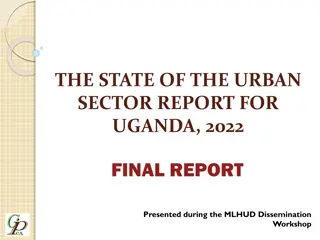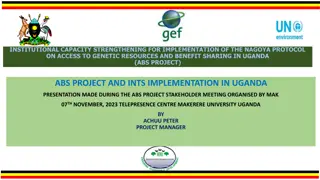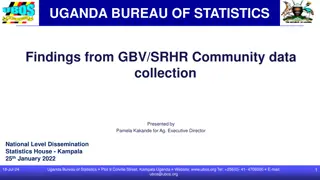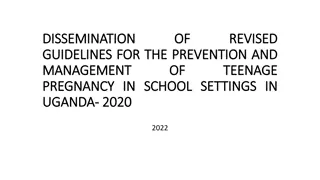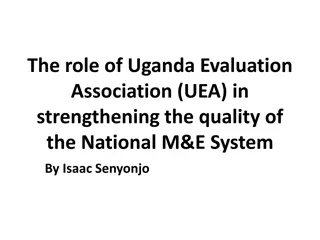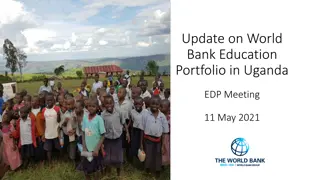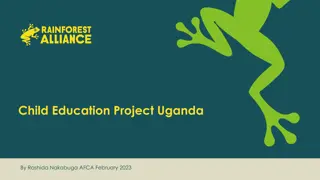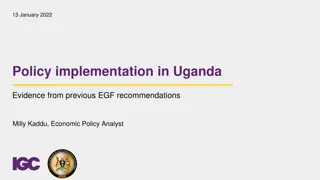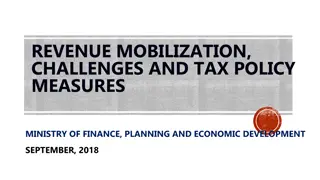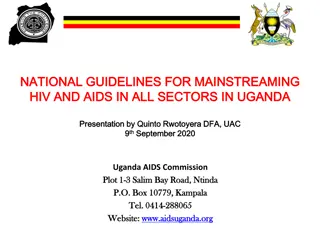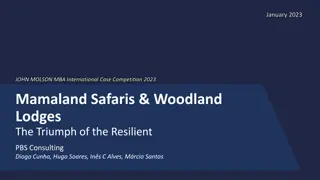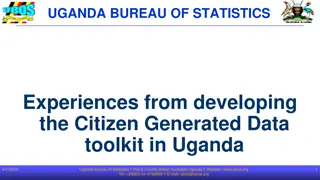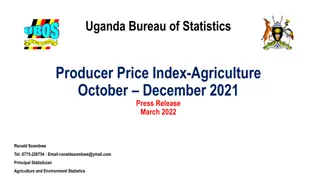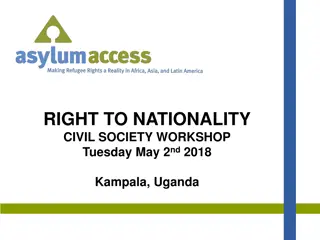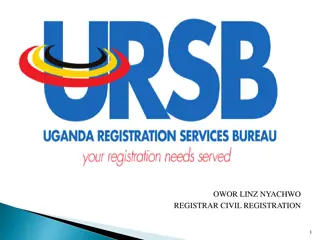Overview of Evaluation Efforts in Uganda
The evaluation landscape in Uganda is examined, highlighting types of evaluations conducted, the use and influence of evaluation results, and the role of the Uganda Evaluation Association. Challenges in evaluation practice are discussed, emphasizing the need for evidence-based decision-making among policymakers. Various evaluation activities at government levels are detailed, along with key evaluation projects and their impact on national policies and programmes. The current evaluation capacity in the country is assessed, identifying opportunities for skills development and the lack of comprehensive evaluation training institutions.
Download Presentation

Please find below an Image/Link to download the presentation.
The content on the website is provided AS IS for your information and personal use only. It may not be sold, licensed, or shared on other websites without obtaining consent from the author.If you encounter any issues during the download, it is possible that the publisher has removed the file from their server.
You are allowed to download the files provided on this website for personal or commercial use, subject to the condition that they are used lawfully. All files are the property of their respective owners.
The content on the website is provided AS IS for your information and personal use only. It may not be sold, licensed, or shared on other websites without obtaining consent from the author.
E N D
Presentation Transcript
BY Margaret Kakande President, Uganda Evaluation Association President, Uganda Evaluation Association 1
Overview of evaluation effort Types of Evaluations done and scope The Use of Evaluation results Influence of Evaluation results Evaluation capacity in country Role of Uganda Evaluation Association Conclusion 2
Policy makers are for evidence based decision making However Evaluation practice is still weak Evaluation activities are scattered in various organizations, at all government levels The Office of the Prime Minister is in- charge of coordinating evaluation activities 3
Ex-ante evaluation on controversial national policies done jointly by research institutions; government ministries and external technical assistance National impact evaluation of poverty programme by independent consultants; and macro-economic policies by CSOs Mid term programme evaluations within sectors by independent consultants 4
Evaluation results have been mainly used by government and development partners. They were mainly government demand driven but funded by development partners National evaluations were used by national level policy makers Mid-term evaluations were mainly for sector ministries and development partners 5
Two major influences at national level - Evaluation of SAPs programme by CSOs reinforced governments resolve to pursue prudent macroeconomic policies - Evaluation of national poverty programme shaped the National Development Plan, as well as monitoring and evaluation efforts Mid term evaluations shaped future programme direction in many sectors 6
Evaluation capacity still weak There are capacity building opportunities in various institutions that impart some evaluation skills However there is no single institution providing a comprehensive evaluation skills development package in country One University is spearheading a post graduate M&E training course but this is focused on maternal health 7
The Association aims at promoting the practice, use, quality and ethics of M&E It is focusing on fostering capacity for evaluation It has created a network to facilitate sharing of relevant information/knowledge on evaluation It is promoting professionalism by defining standards and guidelines for evaluation 8
There is a quest for evaluation work However evaluation capacity in country is still weak There are efforts to foster professionalism within the evaluation fraternity There is need for international support ( both financial and technical) in these efforts 9




